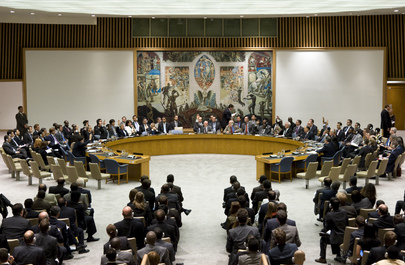More UN sanctions against Iran
10 June 2010
The United Nations Security Council (UNSC) has voted to impose a fourth round of sanctions against Iran over its continued failure to suspend its uranium enrichment activities.
 |
| The UNSC votes on the latest resolution |
Twelve of the fifteen council members voted in favour of Resolution 1929, citing the proliferation risks posed by Iran's nuclear programme and the country's continued failure to cooperate with the International Atomic Energy Agency (IAEA). Brazil and Turkey voted against the resolution, while Lebanon abstained.
The resolution adds to three previous rounds of sanctions imposed in 2006, 2007 and 2008. The latest text builds on previous sanctions by deciding that Iran shall not acquire an interest in any commercial activity in another state involving uranium mining, production or use of nuclear materials and technology.
The UNSC also decided that all UN member states shall prevent the supply, sale or transfer to Iran of battle tanks, armoured combat vehicles, large calibre artillery systems, combat aircraft, attack helicopters, warships, missiles and missile systems. It also asks member states to take all necessary measures to prevent the transfer to Iran of technology or technical assistance related to ballistic missiles capable of delivering nuclear weapons.
In addition, the resolution contains provisions to help block Iran’s use of the international financial system, particularly its banks when they may be used to fund proliferation and nuclear activities.
Annexed to the text of the resolution were measures directed against 41 new named entities and individuals, including one scientist and entities linked to the Islamic Revolutionary Guard and the defence industry, as well as banks and the national shipping line.
The Security Council called upon member states to report within 60 days on the steps they had taken to implement the necessary measures. It also requested that the UN Secretary General, Ban Ki-Moon, creates a panel of experts to monitor implementation of the sanctions.
In a statement, a spokesman for Ban Ki-Moon said: "The Secretary General has consistently stressed the importance for Iran to fully comply with all relevant Security Council resolutions and to cooperate fully with the IAEA to resolve all outstanding issues. These are the essential steps to restore the international community's confidence in the exclusively peaceful purposes of Iran’s nuclear program."
The statement added, "The Secretary General continues to support a comprehensive and negotiated political solution to this issue. In this regard, he welcomes the willingness of the P5 plus 1 (China, France, Germany, Russia, the UK and the USA) to further enhance diplomatic efforts to promote dialogue and consultations. He hopes that talks will resume on this issue of paramount importance."
Fuel swap
In October 2009, a draft agreement on fuel for a research reactor in Tehran was put forward in which Iranian low-enriched uranium would be shipped for further enrichment to Russia and then to France to be fabricated into fuel. However, Iran has yet to approval the agreement.
Last month, Iran, Turkey and Brazil signed a joint declaration that would see Iran swap 1200 kg of its own low-enriched uranium for fuel for the research reactor. Iran officially submitted the agreement to the IAEA on 24 May.
IAEA director general Yukiya Amano has told the agency’s board of governors that he has received letters from France, Russia and the USA expressing their concerns of the Iran-Turkey-Brazil agreement.
While details of the contents of the letters were not released, Amano said: "I will continue to use my good offices to follow up on this new development with the concerned governments."
Researched and written
by World Nuclear News